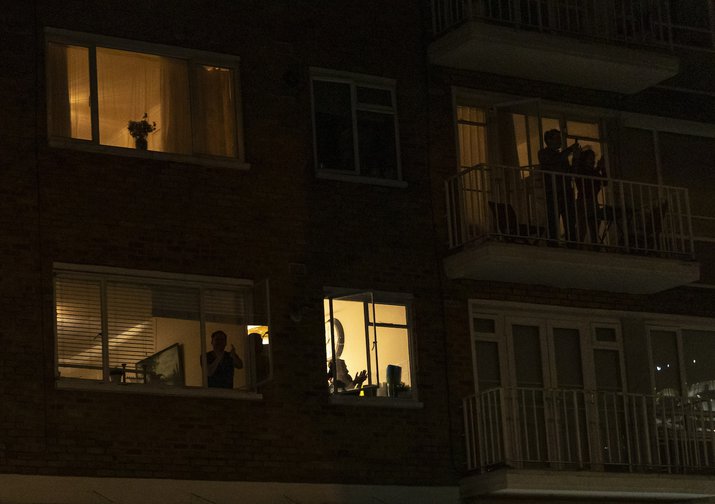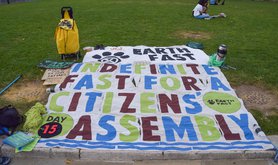
#Clapforcarers: why grassroots solidarity against Coronavirus matters
As people see that we all depend for our safety on the state and its health system, they realise that contra Margaret Thatcher there is such a thing as society.

The coronavirus crisis is a systemic crisis that seems to affect all aspects of our lives, rippling from one social field to another causing widespread damage in the process. As the death count continues rising in most countries around the world and the magnitude of the tragedy becomes apparent, the attention of some is already turning to the devastating economic consequences, with some predicting a 20% drop in GDP and over 20% unemployment as a consequence of the economic shock.
But the implications reach further than that. The experience of extreme stress for frontline workers, starting from carers, and long-term social seclusion for all the population, will also take a heavy psychological toll. The last thing affected countries need at the moment is a collective mental breakdown. What they desperately require instead is a collective show of solidarity, and ways to support those most at risk from the present emergency.
Already during the lockdown in Wuhan different researchers highlighted how lockdown resulted in “serious social psychological impact” for those affected. Similarly, there is profound preoccupation in European countries now affected by this crisis, beginning with Italy, described as “Coronavirus ground zero” – regarding the psychological consequences this long period of lockdown may have on the population. The battle fought in hospital wards, and intensive care units needs to be accompanied by a grassroots psychological war. In the coming weeks keeping up morale, especially among doctors and nurses, will be a major challenge. Social solidarity is fundamental for winning this battle to avoid frontline workers and citizens falling prey to this impact. This means first and foremost that government needs to immediately make up for past mistakes providing carers with protective equipments and adequate pay, besides delivering measures to protect categories that are not covered by its bail-out measures, including renters, self-employed and people on zero-hour contracts. But there is also an important role for the citizenry to play.
The battle fought in hospital wards, and intensive care units needs to be accompanied by a grassroots psychological war.
We’ve got a newsletter for everyone
Whatever you’re interested in, there’s a free openDemocracy newsletter for you.
In these scary and depressing days it has been comforting for many to see demonstrations of collective solidarity from the people taking the most disparate forms. First, in Italy, then in Spain and France, citizens organised flash-mobs to sing national anthems and pop songs from their balconies, as well as to applaud the key frontline workers most affected by the epidemic. From donations to hospitals, to “makers” producing hard-sought after medical equipment that cannot be sourced from the global market, to companies donating some of their protective equipment, to people volunteering to help the elderly, during this difficult time ever new ways are being found for people to help stem the epidemic.
A public applause flashmob has just been launched also in the UK. The hashtag #Clapforcarers that started trending on Twitter on March 26, calls for citizens to participate “in a nationwide applause to thank NHS workers for everything they've been doing”. The aim is to celebrate the unsung heroes that now stand to risk most from this crisis – doctors, nurses, paramedics – who are dealing with the surge in coronavirus patients and who face a high risk of being infected, also because of the dearth of proper protective equipment and the disastrous ways in which government is managing this crisis.
Since the launch of this initiative many leftwingers have criticised the #clapforcarers initiative, on the grounds that one of the initial calls for the flashmob came from London’s LBC radio, with its proud record of embracing the fiscally conservative views that have contributed to the underfunding of the NHS. Furthermore, one of the first people to join the call was secretary of state for health and social services Matt Hancock, who many blame alongside Boris Johnson for the sorry state of the NHS and the botched Coronavirus crisis. The suspicion is that these and other grassroots mobilisation initiatives will sound as hollow as David Cameron’s “we are all in this together” promise.
The suspicion is that these and other grassroots mobilisation initiatives will sound as hollow as David Cameron’s “we are all in this together” promise.
Contrarily from other countries such as Italy and Spain where balcony flashmobs emerged spontaneously without government backing, in the UK the #clapforcarers campaign has more the semblance of an astroturf campaign. Boris Johnson is under heavy criticism for the confused way in which this emergency has been addressed, and for the U-turn in positions the government has made, starting with a by now notorious “herd immunity” strategy only to end in recent days with an Italian-style lockdown. Therefore, he desperately needs some demonstration of collective solidarity in the face of this emergency, in order to refocus people’s attention, hoping to see the boost in ratings experienced by other governments around Europe in response to a dire health and social emergency.
But regardless of the political manouvering behind collective coronavirus flashmobs, what these public rituals put in stark relief is the desperate yearning of the population for some sense of solidarity amidst the crisis. The continuous barrage of tragic news about the spread of the epidemic, the direct experience of relatives and friends dying now affecting many people, the fear for one’s own health that is particularly alarming for older and immune-depressed people, together with the experience of prolonged isolation and social distancing facing people, pose major psychological challenges. By participating in public rituals such as singing with one’s neighbours, engaging in public gym sessions or bingo from their windows and balconies as seen in Italy and Spain, citizens are trying to recuperate some sense of normality amidst the present experience of emergency.
Some speculate that one of the silver linings of this crisis may in the long term be more social cohesion. As people become more aware that we all depend for their safety on the state and its health system, besides becoming better acquainted with their neighbours, they will come to realise that contra Margaret Thatcher there is such a thing as society. This revival of a collective spirit resembles that experienced after previous catastrophes, starting from the Second World War.
What these public rituals put in stark relief is the desperate yearning of the population for some sense of solidarity amidst the crisis.
This is certainly little consolation vis-à-vis the catastrophic scenes witnessed in our hospitals, and the shameful conditions in which our health workers have to operate, putting their own lives on the line. And the coming together of the population in acts of solidarity of all sorts, in the form of donations, volunteering and contributions of all sorts, including moments of public applause for health workers, should not be used by politicians as an excuse to distract the public from their responsibility in the dire state of the NHS and the lack of preparation for this crisis.
What one can hope is that out of the tragedy that is now only beginning to manifest itself in a grisly body count in Europe, the US and more so in Africa which risks being ravaged by the infection – this may be an opportunity for citizens to realise that this crisis is so deep because of an already existing crisis in our collective solidarity. And that the only way to prevent this tragedy from repeating itself in future, with new pandemics to come and the disastrous effects of climate change, is to recuperate a sense of collective solidarity, a stronger awareness that when it comes to many social issues we are really all in this together, and that if we do not properly fund our public services we all stand to lose.
Read more
Get our weekly email




Comments
We encourage anyone to comment, please consult the oD commenting guidelines if you have any questions.